 There are two important late Friday announcements from the newly revived, post-Bush Voting Unit at U.S. Dept. of Justice's Civil Rights Division this afternoon. In both cases, they've raised serious concerns about discrimination by Republican Presidential front-runner Rick Perry's Texas against Hispanic and African-American voters.
There are two important late Friday announcements from the newly revived, post-Bush Voting Unit at U.S. Dept. of Justice's Civil Rights Division this afternoon. In both cases, they've raised serious concerns about discrimination by Republican Presidential front-runner Rick Perry's Texas against Hispanic and African-American voters.
Given the Lone Star State's history of discrimination against racial minorities, new laws and regulations which relate to elections and voting must be pre-cleared by the Dept. of Justice before they can be put into effect, as per Section 5 of the federal Voting Rights Act.
In one finding, the DoJ sees purposeful discrimination against minorities in the state's redistricting plans [PDF] for apportioning both new statehouse districts, as well as four new U.S. House seats being added in the wake of the 2010 census. The new seats are being added due to an increase in the TX population, thanks in no small part, ironically enough, to huge growth in the state's Hispanic population. The DoJ finds the proposed statehouse plan violates Section 5 of the Voting Rights Act, stating that it "was adopted, at least in part, for the purpose of diminishing the ability of citizens of the United States, on account of race, color, or membership in a language minority group, to elect their preferred candidates of choice to the Texas House of Representatives."
The TX plan for the U.S. House didn't fare much better (see below), with similar findings that minorities are likely to see a "retrogressive effect" in their ability "to elect their preferred candidates of choice to the United States House of Representatives" under Perry's approved scheme.
Moreover, in a letter that echoes questions recently sent by the DoJ to the state of South Carolina about their new polling place Photo ID restrictions, as The BRAD BLOG detailed earlier this month, the DoJ has a series of questions concerning Texas' new, very similar restrictions. As the law mirrors the one in South Carolina --- and in many of the other states where the GOP has been able to ram through similar voter suppression bills over the past year --- many of the questions from the DoJ to TX also ask about the their plans for notification about the law, and issuance of free IDs to the more than 600,000 otherwise-legally qualified voters who don't currently own state-issued ID that would meet the strict new requirements to cast a vote at the polls on Election Day.
In TX, the DoJ voting unit is curious about how many of those residents who don't have such IDs also happen to have Spanish surnames...
TPM has more on the redistricting case, including the DoJ documents and additional background. But here are the key points, as they report them this afternoon...
...
[T]he federal agency came out...against the state House of Representatives plan, which they flat out said "violates Section 5 of the Voting Rights Act in that it was adopted, at least in part, for the purpose of diminishing the ability of citizens of the United States, on account of race, color, or membership in a language minority group, to elect their preferred candidates of choice to the Texas House of Representatives."
...
[In addition to finding a retrogressive effect in statehouse districts, the DoJ also found the same problem in the way U.S. House districts are to be apportioned under Perry's plan.]
"When compared to the existing plan, the proposed Congressional plan will have a retrogressive effect in that it will diminish the ability of citizens of the United States, on account of race, color or membership in a language minority group, to elect their preferred candidates of choice to the United States House of Representatives," the Justice Department said in a filing.
As to the DoJ questions about Texas' new Photo ID restrictions, again, see TPM here for details and the DoJ's letter, but these are the main points:
Federal officials also want a detailed description of when and where the state will make free identification certificates available, as well as specifics on how they will educate the public about when such certificates will be available.
Texas officials said that 605,576 residents do not have a Texas drivers license or photo ID card. DOJ wants to know how many of those residents without IDs have Spanish surnames.
Earlier this month, a coalition of state and national voting and civil rights groups asked the DoJ to deny pre-clearance for the TX law, charging, as TPM notes, "that it was unnecessary, unfair, restrictive and intentionally discriminates against African-American and Latino voters."
Texas now has 60 days to respond to the DoJ's questions about the law which, like South Carolina's, may not end up receiving pre-clearance by the federal agency.
Earlier today our own Ernie Canning offered a sharp analysis of a recent U.S. Senate hearing which examined the discriminatory effects of GOP-instituted polling place Photo ID restrictions in other Southern states. In one section, he highlighted comments by Rep. Charles Gonzales (D-TX) who noted that, in order to help ram through the new Photo ID law, Perry declared "a legislative emergency, calling it necessary to combat rampant voter fraud," even as the Texas Attorney General, in a 2006 announcement, was unable to identify "a single case of fraud that would have been stopped" by the law now passed by Republicans in the state.


 'Green News Report' 1/15/26
'Green News Report' 1/15/26
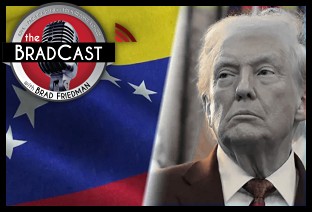 'This Isn't Close to Over': Mad King Trump in Venezuela (and Beyond): 'BradCast' 1/14/26
'This Isn't Close to Over': Mad King Trump in Venezuela (and Beyond): 'BradCast' 1/14/26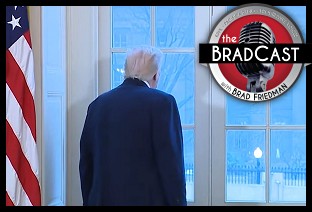 Things Getting Weirder
Things Getting Weirder 'Green News Report' 1/13/26
'Green News Report' 1/13/26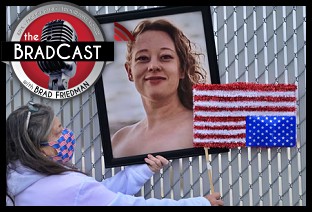 After ICE Murder in MN, Local Cops Disowning Fed Policing Practices: 'BradCast' 1/12/26
After ICE Murder in MN, Local Cops Disowning Fed Policing Practices: 'BradCast' 1/12/26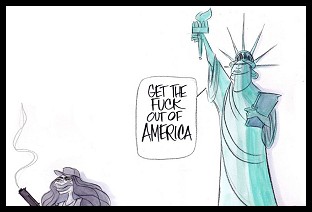 Sunday 'Ice Age' Toons
Sunday 'Ice Age' Toons Trump to Congress, Climate, U.N., Rule of Law, World: DROP DEAD - 'BradCast' 1/8/26
Trump to Congress, Climate, U.N., Rule of Law, World: DROP DEAD - 'BradCast' 1/8/26 'Green News Report' 1/8/26
'Green News Report' 1/8/26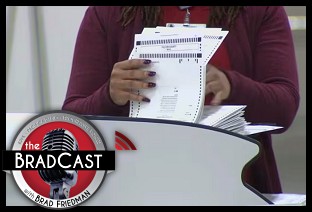 'Nonsense': Trumpers Claim 315k Fraudulent GA Votes in 2020: 'BradCast' 1/7/26
'Nonsense': Trumpers Claim 315k Fraudulent GA Votes in 2020: 'BradCast' 1/7/26 Jack Smith Testimony on Trump J6 Crimes, DOJ Weaponization: 'BradCast' 1/6/26
Jack Smith Testimony on Trump J6 Crimes, DOJ Weaponization: 'BradCast' 1/6/26 'Green News Report' 1/6/26
'Green News Report' 1/6/26 Trump's War on Venezuela is About Ego, Power, Creation of 'Alien Enemies': 'BradCast' 1/5/26
Trump's War on Venezuela is About Ego, Power, Creation of 'Alien Enemies': 'BradCast' 1/5/26 Sunday 'Peace President' Toons
Sunday 'Peace President' Toons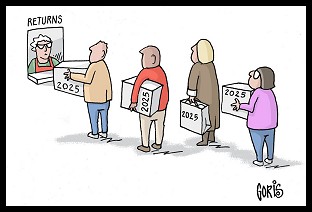 Sunday 'Many Happy Returns' Toons
Sunday 'Many Happy Returns' Toons Have a Holly Jolly Somehow
Have a Holly Jolly Somehow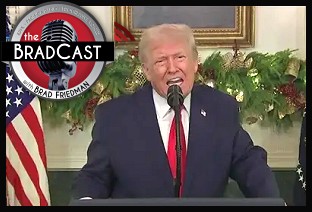 Old Man Shouts at People from WH for 20 Minutes: 'BradCast' 12/18/25
Old Man Shouts at People from WH for 20 Minutes: 'BradCast' 12/18/25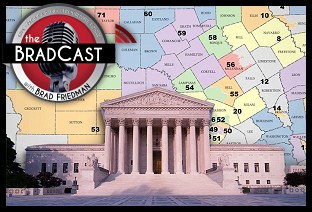 SCOTUS' How-To on Gerrymandering on 'Eve' of Election Year: BradCast' 12/17/25
SCOTUS' How-To on Gerrymandering on 'Eve' of Election Year: BradCast' 12/17/25 Bricks in the Wall: 'BradCast' 12/16/25
Bricks in the Wall: 'BradCast' 12/16/25 'This One Goes to 11': Weekend of Violence, Murder of Rob Reiner: 'BradCast' 12/15
'This One Goes to 11': Weekend of Violence, Murder of Rob Reiner: 'BradCast' 12/15 Trump Now Losing One Battle After Another: 'BradCast' 12/11/25
Trump Now Losing One Battle After Another: 'BradCast' 12/11/25 Dems Continue Stunning 2025 Election Streak: 'BradCast' 12/10/25
Dems Continue Stunning 2025 Election Streak: 'BradCast' 12/10/25 Petrostates and Propa-gandists Undermining Climate Science: 'BradCast' 12/9/25
Petrostates and Propa-gandists Undermining Climate Science: 'BradCast' 12/9/25
 VA GOP VOTER REG FRAUDSTER OFF HOOK
VA GOP VOTER REG FRAUDSTER OFF HOOK Criminal GOP Voter Registration Fraud Probe Expanding in VA
Criminal GOP Voter Registration Fraud Probe Expanding in VA DOJ PROBE SOUGHT AFTER VA ARREST
DOJ PROBE SOUGHT AFTER VA ARREST Arrest in VA: GOP Voter Reg Scandal Widens
Arrest in VA: GOP Voter Reg Scandal Widens ALL TOGETHER: ROVE, SPROUL, KOCHS, RNC
ALL TOGETHER: ROVE, SPROUL, KOCHS, RNC LATimes: RNC's 'Fired' Sproul Working for Repubs in 'as Many as 30 States'
LATimes: RNC's 'Fired' Sproul Working for Repubs in 'as Many as 30 States' 'Fired' Sproul Group 'Cloned', Still Working for Republicans in At Least 10 States
'Fired' Sproul Group 'Cloned', Still Working for Republicans in At Least 10 States FINALLY: FOX ON GOP REG FRAUD SCANDAL
FINALLY: FOX ON GOP REG FRAUD SCANDAL COLORADO FOLLOWS FLORIDA WITH GOP CRIMINAL INVESTIGATION
COLORADO FOLLOWS FLORIDA WITH GOP CRIMINAL INVESTIGATION CRIMINAL PROBE LAUNCHED INTO GOP VOTER REGISTRATION FRAUD SCANDAL IN FL
CRIMINAL PROBE LAUNCHED INTO GOP VOTER REGISTRATION FRAUD SCANDAL IN FL Brad Breaks PA Photo ID & GOP Registration Fraud Scandal News on Hartmann TV
Brad Breaks PA Photo ID & GOP Registration Fraud Scandal News on Hartmann TV  CAUGHT ON TAPE: COORDINATED NATIONWIDE GOP VOTER REG SCAM
CAUGHT ON TAPE: COORDINATED NATIONWIDE GOP VOTER REG SCAM CRIMINAL ELECTION FRAUD COMPLAINT FILED AGAINST GOP 'FRAUD' FIRM
CRIMINAL ELECTION FRAUD COMPLAINT FILED AGAINST GOP 'FRAUD' FIRM RICK SCOTT GETS ROLLED IN GOP REGISTRATION FRAUD SCANDAL
RICK SCOTT GETS ROLLED IN GOP REGISTRATION FRAUD SCANDAL VIDEO: Brad Breaks GOP Reg Fraud Scandal on Hartmann TV
VIDEO: Brad Breaks GOP Reg Fraud Scandal on Hartmann TV RNC FIRES NATIONAL VOTER REGISTRATION FIRM FOR FRAUD
RNC FIRES NATIONAL VOTER REGISTRATION FIRM FOR FRAUD EXCLUSIVE: Intvw w/ FL Official Who First Discovered GOP Reg Fraud
EXCLUSIVE: Intvw w/ FL Official Who First Discovered GOP Reg Fraud GOP REGISTRATION FRAUD FOUND IN FL
GOP REGISTRATION FRAUD FOUND IN FL

































